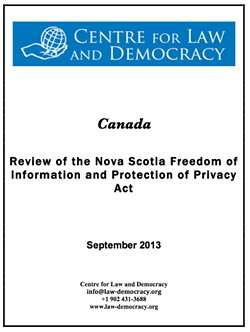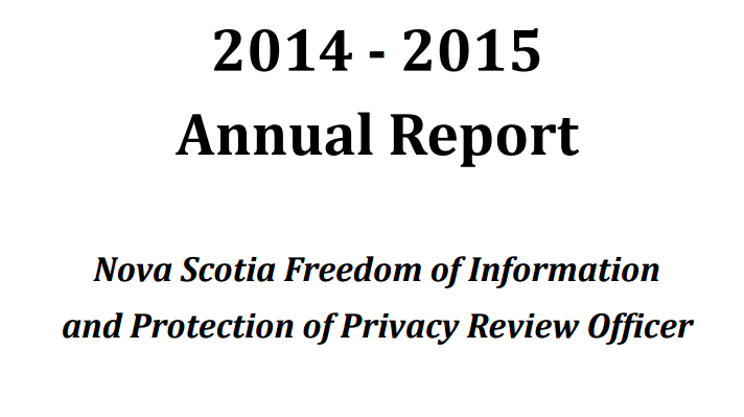Last month, the Centre for Law and Democracy published a report that reviewed Nova Scotia's freedom of information law. The report compared Nova Scotia to other jurisdictions around the world, using a rating system CLD has developed to assess freedom of information laws and practices. Nova Scotia scored a pathetic 85 points out of 150, placing the province at the same level as Honduras and Belize. CLD then made 18 detailed recommendations for improving Nova Scotia's freedom of information law processes.
In the wake of the CLD report, all three party leaders mouthed a vague willingness to "consider" it, so CLD took an additional step to try to pin the leaders down. CDL boiled its 18 recommendations down to just three, and asked the leaders to commit to those three, as follows:
1. If elected Premier, I will expand the powers and mandate of the Review Officer, particularly through granting her order-making power."None of these three ideas are particularly radical," says CLD. "For example, oversight bodies in Alberta, British Columbia, Manitoba, Ontario, Prince Edward Island and Quebec all have the power to issue legally binding orders. In India, a country which has thirty times Canada’s population, and where the public sector has far less access to advanced data management technology, the Right to Information Act, 2005 requires government officials to respond to requests within 30 days with no possibility of an extension."
2. If elected Premier, I will impose a binding timeline of 30 days, extendable once by a maximum of 30 days, for responding to access to information requests.
3. If elected Premier, in our dealings with government lawyers, my government will only claim solicitor-client privilege in cases where confidentiality is necessary to protect an impending court case or negotiation.
All three parties responded to CLD's request. The Liberals' response was signed by leader Stephen McNeil. It simply reiterates CLD's three commitments, followed by McNeil's signature.
The PC's response was signed by Rob McCleave, leader Jamie Baillie's chief of staff. It is more verbose than McNeil's response, but likewise in no uncertain terms agrees to CLD's three recommendations.
The NDP's response was signed by Dan O'Connor, premier Darrell Dexter's chief of staff. It objects to each of CLD's recommended commitments, as follows:
1. If elected Premier, I will expand the powers and mandate of the Review Officer, particularly through granting her order-making power.
NDP's objection:
The NDP is open to considering research and policy analysis that would show how the more complex and costly review system in other provinces improves citizens’ timely access to information, by comparison to the experience in Nova Scotia.CLD's response to that objection:Nova Scotia takes a unique approach to its Freedom of Information legislation. The very strong purpose clause and strictly limited exceptions and exemptions ensure openness well after the legislation took effect. Reviews are accessible and timely because the Review Officer does not have quasi-judicial powers or the more complex and costly procedures required to exercise such powers, unlike Review Officers in provinces with much more limited purpose clauses and broader exemptions. The current law also enables Nova Scotia to consider a wide range of citizens, such as journalists, for appointment to the position of Review Officer.
The relatively few cases taken to the judicial level have provided enduring guidance on the basic principles of the legislation, none more so than my own appeal in the case of O'Connor v. Nova Scotia, 2001 NSCA 132.
Your chief objection to this change seems to be that it will have a negative impact on the cost, speed and efficiency of the oversight process. We believe the reverse is true. In practical terms, there is no reason why making the Review Officer’s decisions legally binding should complicate the investigations process. The experience of other jurisdictions is that binding decisions enhance cooperation from public bodies, thereby speeding up the review process. In the United Kingdom, for example, where the oversight body has order powers, the vast majority of all appeals are processed within three months. Order-making power also removes the discretion that public bodies currently have to ignore her recommendations, including as to procedural matters.2. If elected Premier, I will impose a binding timeline of 30 days, extendable once by a maximum of 30 days, for responding to access to information requests.Your response also notes that the current law “enables Nova Scotia to consider a wide range of citizens, such as journalists, for appointment to the position of Review Officer”. While the current Review Officer has a law degree, we are aware that previous Review Officers (Darce Fardy) did not. In jurisdictions around the world, oversight bodies with order-making power are staffed by non-lawyers. Regardless of whether the office is granted order-making power, it is critically important that the Review Officer should be someone who is competent to make decisions about access to information. If a candidate lacks the competency to make these decisions, then that person should not serve as the Review Officer regardless of their educational or professional background.
NDP's objections:
The NDP will consult with FOI Officers and the Review Officer to ensure that public bodies are acting appropriately when using the discretionary 30 day extension from the mandatory 30 day timeline in the legislation. The NDP will also consult the Review Officer about the cases where she permits more than 60 days because it should only be in rare circumstances such as a very large volume of records or third party considerations.CLD's response to that objection:
We acknowledge that Nova Scotia scored highly on the 2012 Freedom of Information Audit. However, it is worth noting that, in being measured against other Canadian jurisdictions, the comparison is among a relatively weak peer group. Moreover, the Review Officer has noted that recent years have seen a large increase in the number of both extension requests and extension-related complaints by requesters. We welcome your commitment to consult with FOI Officers and the Review Officer to ensure that extensions are being used appropriately, and your acknowledgement that extensions beyond 60 days should be a rarity. But setting firm time limits is better practice. Such rules are in place in many countries, where they have kept the response time short, to the benefit of requesters.3. If elected Premier, in our dealings with government lawyers, my government will only claim solicitor-client privilege in cases where confidentiality is necessary to protect an impending court case or negotiation.
NDP's Objections:
The NDP would welcome an opportunity to hear the Centre’s reasons for this request. Solicitor- client privilege is an important principle of the common law. Canadian courts have found that waiver of privilege in one situation usually means that the privilege is deemed to be waived in all situations, even those not anticipated at the time of the original waiver. Again, it would be very useful to know the Centre’s analysis of how this would advance the overall public interest, particularly when Nova Scotia’s application of the privilege in the FOIPOP Act is strictly limited by the higher courts.CLD's response to that objection:
We recognise that this is probably the most difficult of our three recommendations to carry out, since this is deeply ingrained within the culture of government. Solicitor-client privilege is, as you note, “an important principle of the common-law”. However, there are important differences in the nature of the solicitor-client relationship as regards government lawyers. Solicitor-client confidentiality exists for two reasons, to allow lawyers to plan their strategies for upcoming litigation (litigation privilege) and to promote candour between lawyers and their clients. While the first of these is clearly necessary for government lawyers, since governments are frequently involved in litigation, the second is not, or at least is not over and beyond the protection already provided by other exceptions (for example to preserve the free and frank flow of information inside of government).The complete NDP response is here. CLD's complete response back to the NDP is here. See CLD's complete recap of this issue here.When public officials deliberate with government lawyers they do not need the protection of secrecy to protect their communications; they are not confessing their involvement in criminal enterprises or their infidelities, they are merely conducting government business. Moreover, government counsel often play a range of roles in policy development, planning and administration which are functionally similar to those of their non-legally trained colleagues. It is difficult to see why protection should apply to this advice just because it happens to come from a lawyer. Furthermore, the solicitor-client privilege exception as currently worded provides tremendous potential for abuse since, if government officials want particular discussions to be exempt from disclosure, all they need to do is bring a lawyer into the room.
















